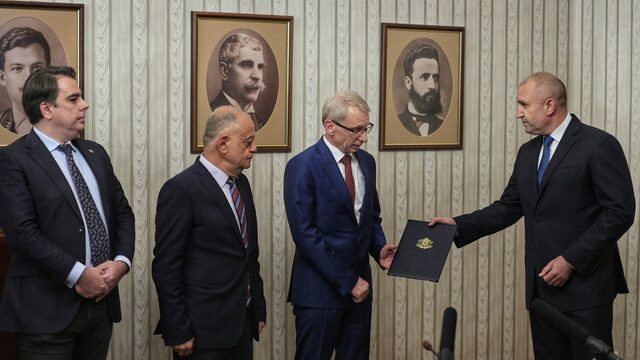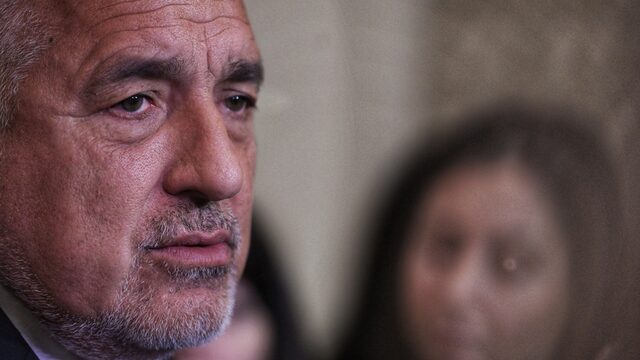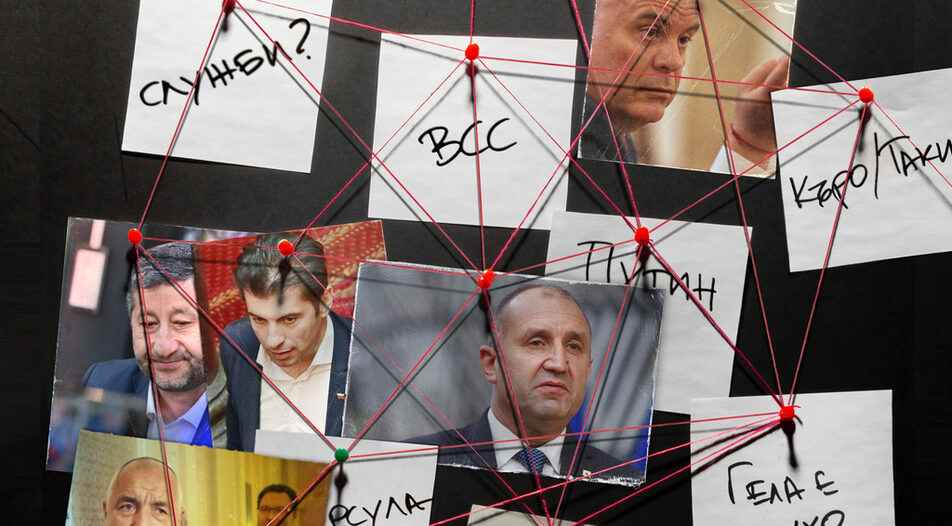A few days ago, a colleague who's a correspondent for a German media in Bulgaria, asked a simple question on social media: how do you explain in 2 minutes to an audience that is not versed in the intricacies of Bulgarian politics what the hell has been going on over the past few weeks?
I honestly don't think this is possible. Luckily, we have our whole newsletter and not 2 short minutes, so let's give it a try:
First of all, you might have noticed yourselves, but just so we are clear: Bulgaria is undergoing an unprecedented and unseen crisis of governance. This is not simply a political or constitutional crisis, or one concerning the judiciary alone. It is also not simply a mafia war, although it sure looks like this at times.
We are seeing an attempt by several actors - some rising, some falling, some attempting to stay afloat - to redistribute power and realign according to the new domestic and international realities. So far, there has been no clearcut result from that - which means that there will be more to come in coming weeks.
Secondly, we only see the surface of these fights. Yes, we get glimpses of its not-so-pretty underbelly (like with the leaked WCC council recording), but as Bulgaria has always been a captured state of some sorts, the real interests (and sometimes - the real players) in the game of power often remain obscured - until they've already won.
So, with these caveats in mind, let's try to answer some of the big questions:
Q: Is theregoing to be a cabinet between WCC-DB and GERB?
A: Most likely yes. But it would likely look very different from the one proposed by Prof Nikolay Denkov a few weeks back. GERB cunningly took advantage of the leaked WCC recording to pressure the party to drop some of the "political" faces it proposed, like Daniel Lorer and, especially, Assen Vassilev. And even if Mr Vassilev remains, there would likely be other concessions made - so let's see.
Q: Who are the big winners from the leak?
A: We won't talk about the losers, because they are clear - WCC-DB (and especially WCC, whose improvisations took them to new lows - who on earth runs a national party congress to discuss a "non"-coalition with your sworn political enemy over Zoom?!).
But there are some notable winners who are currently aligning themselves against the reformists and the cabinet they've been trying to broker with GERB.
First, the other parties, including MRF, Vazrazhdane, TISP and BSP, have taken the opportunity to bash WCC, call them traitors and erode the little popular desire for change that had remained after the 2020 protests.
The other - more important - winner, however, is President Rumen Radev. The President suddenly found himself armed with enough ammunition to target both of his enemies (Boyko Borissov's GERB and WCC-DB) simultaneously, which works just great for him.
More importantly: he has gained a formal reason to launch the unofficial coup he has been staging for the past few years. Mr Radev openly called a potential Denkov government - the only possible government in this parliament - "discredited" and recommended to WCC-DB not to even try fulfilling it. And this comes from the person who has for years repeated how important it is for the parliamentary parties to form a cabinet and break the political deadlock. This can hardly be explained by a leaked recording of an internal discussion, however scandalous it is, but it gave him carte blanche to say something he couldn't say otherwise.
Another important detail is how the State Prosecution had been acting up lately: at the moment, judging by what is happening, the prosecution is lining up with the Interior Ministry (controlled by Mr Radev) and the secret services (also under his control), which has not happened since Borissov. But this time the direction is anti-Borissov and anti-WCC. In WCC's leaked recordings, the leaders of the party also say they fear Radev is making a move to "capture" key mayors across the country.
In short, we have a President who controls or is in alignment with all key repressive institutions in the country, allegedly has plans for the upcoming local elections and suddenly is against parliament making decisions about the future government. Whoever remembers the early days of GERB might have flashbacks to the behavior of Mr Borissov in the 2009-2020 period, controlling most municipalities, the secret services, the prosecution
What is missing from this equation is a party endorsed by the president. But the track record of the Bulgarian political system in producing parties that rise and fall in a matter of months is pretty good, so don't be too surprised if something like this happens very soon.

What's worse is that the only glimmer of hope for the more progressive Bulgarians - the WCC-DB coalition - seems bound to crash, one way or another. If they form a cabinet with GERB, they will lose the trust of their own supporters. If they don't - they will be punished in the early election. And in any case, the leaked recording showed that WCC - or at least its leaders, Mr Petkov and Mr Vassilev - have a very similar vision of how to control the repressive apparatus as their opponents. Even if we can absolve them on account of their having "better intentions" than their opponents, it is clear that they can't play the game as well as the other power players and the center of power will be moving towards someone else now
1. Politics this week:
Let's recap: President reluctantly passes second mandate to Denkov
On Monday afternoon President Rumen Radev passed the second exploratory mandate to Prof Nikolay Denkov (WCC) in what can be described as a very reluctant and unprecedented fashion, directly telling WCC's PM nominee that he prefers that the professor does not even try fulfilling it.
The President justified himself by saying that he sees it as inappropriate to put Bulgaria's fate in the hands of the WCC leaders after the leaked recordings because they have allegedly "torpedoed Bulgaria's sovereignty," "planned a purge in the [security] services and state administration" and have discredited EU leaders. He added, however, that under the constitution he was obliged to hand over the mandate and called on the WCC-DB "to reconsider entirely the expediency of using this mandate", which Radev said had already been "discredited."
In the meantime, the cabinet negotiations between GERB and WCC-DB seem to be ongoing, but with no clear decision in sight.
"Reformed" secret services strike WCC
Mr Radev also notably attempted to discredit WCC further by saying that the Bulgarian secret services have already been reformed by him. Yet, the way that several secret service directors, including the head of the National Security Agency (DANS), the foreign intelligence agency and several others acted when they were summoned to Parliament for a hearing demonstrated otherwise. Instead of sticking to their professional capacities, the directors launched a smear campaign against WCC.
It was alleged that DANS is investigating Mr Petkov's foreign policy advisor, Vessela Tcherneva (who helped broker the "French proposal" with N. Macedonia) over charges of treason for having given sensitive information to a Macedonian politician. Additionally, the Minister of Interior Ivan Demerdzhiev attacked the Petkov cabinet for alleged spending irregularities during the Ukraine refugee crisis last year.
Both of these claims are completely absurd - DANS does not have investigative powers or the right to say what is "Bulgaria's national interest" that Ms Tcherneva has allegedly violated, and Mr Demerdzhiev failed to account for the fact that Bulgaria currently hosts just a fraction of the refugees that were housed under the Petkov cabinet. But it showed that Mr Radev is very happy to use his proteges against his opponents the same way that Mr Borissov did.
2. Law and order

"Barcelonagate" revived
On Tuesday evening, Sofia City Prosecutor's Office requested that the Prosecutor General ask for the removal of the parliamentary immunity of Boyko Borissov. The proposal was made in connection with pre-trial proceedings known in the media as "Barcelonagate" - the supposed illicit purchase of a high-end property in the coastal Catalan town for a woman, allegedly close to Borissov. According to the prosecution, evidence has been gathered of a crime under Article 253 of the Criminal Code committed by him, i.e. money laundering. A day earlier, businessman Alexander Staliyski, who is close to GERB, was summoned to the prosecutor's office for questioning. Back in 2009, BSP leader Sergei Stanishev announced that there was a circle around Borissov, and named Staliyski as a central figure in it. It seems that Borissov's immunity is only part of the overall activation of the prosecution in the last couple of days. For now, Mr Borissov has refused to give up his immunity.
The return of the "Eight Dwarfs"
Another half-forgotten corruption scandal came back to life this week - the scheme to corrupt and extort magistrates that was supported by former investigator Petyo Petrov, known as Petyo Evroto, whose name became widely known to the public along the investigation of the Anti-Corruption Fund (ACF) "The Eight Dwarfs". According to new testimony from Lyubena Pavlova, the ex-wife of Petro Evroto, who only three years ago was actively involved in the blackmail undertaken by her husband Petrov, Deputy Prosecutor General Borislav Sarafov, who is also the director of the National Investigation Service, maintained very close relations with Petro Evroto. He also regularly visited "on business" the restaurant "The Eight Dwarfs" in the center of Sofia, which Petrov had turned into his office. This information is interesting in itself, but also comes at a time of grave tensions between Mr Sarafov and Prosecutor General Ivan Geshev, so it might have bigger meaning in the grand scheme of things.
3. Economy:
Caretaker cabinet proposes new extension budget
As June 10 approaches, the question of what is happening to the state's finances and whether it will be able to pay its bills smoothly is increasingly present in the media. On that date, the current 2022 budget extension law, which allows the government to pay as normal until there is a financial plan passed for the year, will end. And since one is not on the horizon, at least for now, given the deepening political crisis, this is of crucial importance. On Tuesday, the caretaker cabinet submitted a new draft to parliament for a second extension of last year's budget. In the meantime, another document - a draft decision setting an additional deadline for collecting revenue, incurring expenditure and granting transfers - is now published on the National Assembly's website. It will, roughly speaking, untie the hands of the state to make payments after June 10 until the 2023 budget is adopted - or the second extension of the current one.
Figures:
15%
The Central Bank (BNB) hinted that from autumn it may still raise the minimum reserve requirement for banks to 15%. Just a month ago, BNB raised these requirements from 10% to 12%.
6.8 billion
According to the central bank's estimates, the tightening would lead to a withdrawal of BGN 6.8 billion of liquidity and a slowdown in credit growth by about 4 percentage points.
4. Business:
Telecommunications
Telelink Business Services Group
Another quarter of the shares of the telecom will be offered on the Bulgarian Stock Exchange in early June. This is the idea of Lyubomir Minchev, the founder of the company, which is engaged in the construction and maintenance of information communication systems. The total amount of the offering could reach BGN 30 million.
E-mobility
Eldrive
The leader in the e-mobility segment in Bulgaria has around 500 charging stations across the country - this is almost half of the 1154 official charging stations, according to the vsichkotok.bg specialized website.
Retail
JYSK
By the end of the year the Danish chain will open six new stores in the country and will renovate five of the existing ones, Yassen Panayotov, distribution manager for JYSK in Bulgaria, told journalists. The company did not specify the cities where the new outlets will be located, but said that JYSK will enter three of them for the first time.
5. Watch out for:
Date:
5 June
By 17:00 on Monday, WCC's nominee for PM Nikolay Denkov has to return the second exploratory mandate - in the best case scenario with a proposed cabinet - to President Radev.
Place:
Sofia
The capital might soon ban e-scooters in parks and many pedestrian areas, according to a newly proposed Sofia Municipality bill.
Person:
Ivaila Bakalova
The ex-model is the new star in the "Barcelonagate" scandal. This week she told Nova TV that Boyko Borissov has threatened her over her testimonies in the money laundering case against him.
Меки китки (Soft wrists)
Casual homophobia is so ingrained in the Bulgarian lexicon that even the "good guys" like WCC's Yavor Bozhankov used it to denigrate his opponents from Vazrazhdane, calling them "меки китки" - a slang phrase for gay people, also used to describe someone who does not stay true to their principles. All of this happened on 1 June, the first day of Pride month, and almost caused a brawl in Parliament.
A few days ago, a colleague who's a correspondent for a German media in Bulgaria, asked a simple question on social media: how do you explain in 2 minutes to an audience that is not versed in the intricacies of Bulgarian politics what the hell has been going on over the past few weeks?
I honestly don't think this is possible. Luckily, we have our whole newsletter and not 2 short minutes, so let's give it a try:












